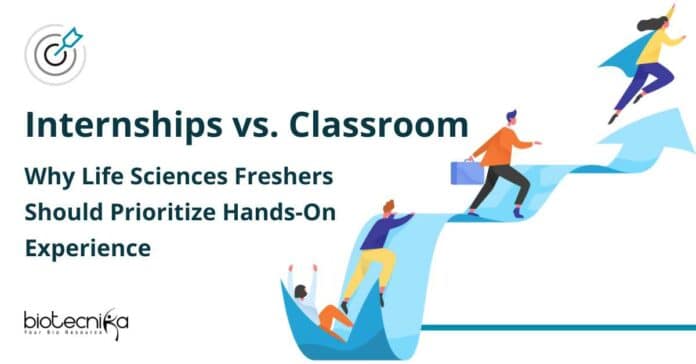Internships vs. Classroom: Why Life Sciences Freshers Should Prioritize Hands-On Experience
In today’s competitive job market, life sciences freshers face the challenge of proving their capabilities and standing out among their peers. While a classroom education provides a solid foundation of theoretical knowledge, it often falls short when it comes to practical skills and real-world application. Internships play an essential role in this regard. In this article, we will explore why life sciences freshers should prioritize hands-on experience through internships and how it can benefit their career growth.
Importance of hands-on experience in life sciences
Life sciences is a field that heavily relies on practical application and experimentation. From conducting laboratory research to analyzing complex data, the ability to translate theoretical concepts into tangible results is vital. Hands-on experience enables newcomers to acquire vital skills like laboratory techniques, data analysis, and critical thinking, which hold significant value in the industry.
Internships vs. Classroom: Why Life Sciences Freshers Should Prioritize Hands-On Experience
Benefits of Internships for life sciences freshers
Gaining practical skills and knowledge
Internships provide an immersive learning environment where freshers can apply their theoretical knowledge to real-life scenarios. By working alongside experienced professionals, they can gain practical skills specific
to their field of interest. Whether it’s performing experiments, conducting data analysis, or operating sophisticated laboratory equipment, internships offer valuable hands-on training that enhances their skill set.Molecular Biology Techniques Summer Internship With Wet Lab Hands-On Training
Perform LIVE Experiments + Wet Lab Hands-on Training Under Expert Guidance.
Duration: 30 Days (15 Days Virtual – Online LIVE + 15 Days Wet Lab Hands-On Training In Our Partner Labs in Kolkata, Delhi NCR & Bangalore)
Building a professional network
Internships provide a fantastic chance to establish a professional network, connecting with industry contacts that can be invaluable for future career growth. Establishing connections with mentors and colleagues can open doors to future collaborations and references, which can significantly benefit their career advancement.
Enhancing job prospects
Having relevant internship experience on a resume can significantly boost a life sciences fresher’s job prospects. Recruiters and employers value practical experience as it demonstrates a candidate’s ability to apply knowledge in real-world settings. Internships also provide an opportunity to showcase skills, work ethic, and adaptability, which can set them apart from other candidates during the hiring process.
Limitations of classroom learning for life sciences freshers
While classroom education forms the foundation of knowledge in life sciences, it has its limitations when it comes to practical application and industry exposure.
Theoretical knowledge vs. real-world application
Classroom learning primarily focuses on imparting theoretical knowledge, which may not fully prepare freshers for the challenges they may face in practical settings. The ability to apply concepts and theories to real-world situations is essential for success in the life sciences industry.
Lack of industry exposure
Traditional classroom settings often lack exposure to the realities of the life sciences industry. Freshers may possess a restricted grasp of the latest trends, cutting-edge technologies, and industry best practices. This can hinder their ability to adapt quickly to the demands of the job market.
Internships vs. Classroom: Why Life Sciences Freshers Should Prioritize Hands-On Experience
Limited practical training opportunities
In a classroom environment, practical training opportunities may be limited due to constraints such as time, resources, and class sizes. Freshers may miss out on hands-on experiences that are crucial for developing practical skills and gaining confidence in their abilities.
R Programming Online Internship For Biologists With LIVE Projects
Join the R Programming Online Internship for Biologists With LIVE Projects and unlock your potential in the exciting realm of data-driven biology.
Bridging the gap: Combining internships and classroom education
To address the limitations of classroom learning, it is essential to integrate hands-on experiences into the curriculum and promote collaborations between academia and industry.
Integrating practical experiences into the Curriculum
Educational institutions can enhance their life sciences programs by incorporating practical components into the curriculum. This can include laboratory sessions, research projects, and fieldwork opportunities. By providing students with regular hands-on experiences, they can develop the necessary skills alongside theoretical knowledge.
Collaborations between academia and industry
Partnerships between educational institutions and industry organizations can create valuable opportunities for freshers. Through collaboration on research projects, internships, or mentorship programs, academia and industry can effectively bridge the gap between classroom education and real-world application. This collaboration enables students to work on industry-relevant projects and gain exposure to the latest advancements in the field.
Experiential learning programs
Experiential learning programs, such as cooperative education or work-study programs, allow freshers to alternate between classroom learning and practical work experience. These programs offer a structured approach to gaining hands-on experience while pursuing an academic degree. By integrating internships with classroom education, students can apply their knowledge in a professional setting and acquire valuable insights into their future careers.
Internships vs. Classroom: Why Life Sciences Freshers Should Prioritize Hands-On Experience
Success stories: Real-life examples of life sciences interns
To highlight the impact of internships on the career development of life sciences freshers, let’s explore two success stories.
Case study 1: Harsh’s transformative internship experience
Harsh, a life sciences student, secured an internship at a leading pharmaceutical company during his summer break. During his internship, he worked on a research project focusing on drug development. Harsh not only gained practical experience in the laboratory but also learned about the regulatory processes and quality control measures in the pharmaceutical industry. The internship not only boosted Harsh’s confidence but also helped him secure a job offer from the same company upon graduation.
Case study 2: Anusha’s journey from the classroom to the lab
Anusha, a recent graduate in biochemistry, struggled to find a job after completing her degree. Realizing the importance of practical experience, she decided to pursue an internship in a research laboratory. Through her internship, Anusha developed essential laboratory techniques, honed her analytical skills, and collaborated with experienced researchers. Her internship experience not only filled the gap in her resume but also provided her with valuable industry connections, which eventually led to a full-time research position.
Overcoming challenges: How to find internships in life sciences
Finding internships in the life sciences industry may seem challenging, but with the right approach, freshers can secure valuable opportunities.
Check out the latest internship opportunities here!
Researching internship opportunities
Conduct thorough research to identify organizations, companies, and research institutions that offer internships in the life sciences field. To gather information about internship programs and application processes, it is beneficial to explore organizations’ websites, job portals, and social media platforms.
Networking and utilizing professional platforms
Building a professional network can be achieved by attending career fairs, industry conferences, and seminars, as well as connecting with professionals in the field through platforms like LinkedIn. Engage in conversations, join relevant groups, and express your interest in internships. Networking can help you discover hidden opportunities and gain insights from experienced professionals.
Approaching companies and academic institutions
Take the initiative to approach companies and academic institutions directly. Send well-crafted emails or letters expressing your interest in internships and highlighting your qualifications. Be proactive and follow up on your applications to increase your chances of securing an internship opportunity.
Internships vs. Classroom: Why Life Sciences Freshers Should Prioritize Hands-On Experience
Frequently Asked Questions
Can internships replace classroom learning for life sciences freshers?
No, internships cannot replace classroom learning entirely. Classroom education provides the necessary theoretical knowledge and foundational understanding of life sciences. However, internships complement classroom learning by offering practical skills, real-world experience, and industry exposure.
How long should an internship in life sciences be?
The duration of internships in life sciences can vary. Some internships may last for a few weeks, while others can span several months. The length of an internship depends on the organization, project requirements, and individual agreements. It is essential to consider the learning objectives and the depth of experience you wish to gain when deciding on the duration of an internship.
Do internships guarantee job offers in the life sciences industry?
While internships can enhance your job prospects, they do not guarantee job offers. Internships provide valuable experience, skill development, and networking opportunities, which can increase your chances of securing a job in the life sciences industry. However, job offers ultimately depend on various factors, including the job market, your performance during the internship, and the specific requirements of the hiring organization.
Are internships only available for students pursuing higher education in life sciences?
No, internships are available for individuals at different stages of their academic journey. While internships are commonly associated with students pursuing higher education, many organizations offer internships to recent graduates or individuals looking to transition into the life sciences field. The availability of internships may vary based on the organization and their specific requirements.
How can I make the most out of my life sciences internship experience?
To make the most out of your life sciences internship experience, be proactive, and take initiatives. Seek opportunities to learn, ask questions, and contribute to projects. Develop meaningful connections with colleagues and mentors, actively seeking their feedback to enhance your skills. Furthermore, it is essential to document your achievements and the skills you acquired during the internship. This documentation will prove valuable when updating your resume and discussing your experience in future job interviews.
Conclusion
In the life sciences industry, hands-on experience through internships is crucial for the career growth of freshers. While classroom learning provides a strong foundation, internships offer practical skills, industry exposure, and networking opportunities that can significantly enhance job prospects. By combining internships with classroom education, freshers can bridge the gap between theory and practice, ensuring they are well-prepared for the challenges of the industry.











































